Editorial board 2018-2019
The editorial board consists of eight enthusiastic students of the Master Programme Neuroscience and Cognition. Each is responsible for a different function: the chief editor leads the editorial board and is responsible for the journal as a whole; public relations (PR), sponsoring, and finance promotes the journal, attracts financial support, and manages the budget of the journal; the secretary writes the minutes, manages the e-mails and distributes the issues; the editors search for and approach contributors, solicit manuscripts, revise submitted content, and send it to reviewers; the layout & website team is responsible for the management of the journal’s layout and website. New board members are selected in October from the first year students of the Master.

“‘If the brain would be so simple we could understand it, we would be so simple we couldn’t’ is one of my favorite quotes. The complexity of this organ is what makes it so difficult to study, but also makes it fascinating. The Journal of Neuroscience and Cognition is a platform for students to communicate their findings, which is the most important task in science. This years Editorial Board is a true team, and all very motivated, to make Volume 13 a great one!”
“Behavioral biologists often consider the brain a black box. I’m a behavioral biologist. The master “neuroscience and cognition” is an opportunity for me to think out of the box and look in to that black box by combining behavior with neuroscience. I joined the journal to keep in touch with my fellow students during our internships and to keep track of the current trends in neuroscience.”
“What I really like about neuroscience is that it is the place where psychology, biology, physiology, and cognition come together to gain insight into the brain’s function. By studying neuroscience, I aim to contribute to our understanding of neurological and psychiatric disorders. The reason why I joined the board of the Journal, is because it gives students the opportunity to share their new findings, experiences and opinions in a way that we can keep inspiring and motivating each other.”
“The brain as this dynamic structure that has so many different functions in the human body has always fascinated me. My specific interest in the field of ‘Neuroscience and Cognition’ started during my bachelor in Biomedical Sciences. Neuroscience is a work field in which you can study both cognitive and experimental aspects, providing a great variety of topics. Joining the editorial board of this Journal is very exciting, as it is a great way to learn new skills and keep up with recent research that is happening in the field.”
“I’m fascinated by how the field of neuroscience can accommodate people with such diverse backgrounds to work towards a common goal: to unravel the enigma that is the human brain. Coming from a psychology background, I work with others from biology, physics or even artificial intelligence. This journal gives these different voices a common platform to reveal the latest developments in the field, and I’m ecstatic to be a part of such a wonderful board that gets to put these voices together.”
“The brain is a very complex organ and still a lot of things are unknown about the processes in the brain. Communication is key to unravel the mysteries of the brain. Journals are commonly used to communicate with other researchers and the public. The Neuroscience and Cognition Journal is a way of communication between Neuroscience and Cognition students and a nice way to stay in touch with your fellow students, but also a way to get acquainted with the process of publishing in a journal which might be useful in the future!”
“It inspires me to see how the human brain is capable of things we cannot explain, and I’m intrigued by the brain making us so irrational, biased, and subjective while we try so hard not to be. Neuroscience gives us a chance to unravel these mysteries. One of the pitfalls for scientists is to unconsciously develop a tunnel vision within their own expertise. Therefore, I really like the variety of people and approaches within the journal, and I love to contribute to this.”
“The amount of neuroscientific knowledge that has been revealed in the past decades is astonishing, and it is both humbling and inspiring to think about how much more there is for us to discover. Exploring how the human mind works fills me with a sense of purpose, and I am excited to be part of the editorial board - I believe it will be a great learning experience and a creative way to showcase the endeavours of the current generation of neuroscience master students.”



